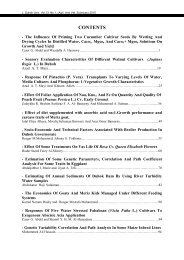Create successful ePaper yourself
Turn your PDF publications into a flip-book with our unique Google optimized e-Paper software.
J. Duhok Univ., Vol. 14, No.1 (Pure and Eng. Sciences), Pp 1-8, 2011<br />
1. to re-anounce the technocratic attitude for<br />
defining the optimum in favour of the<br />
construction of various open alternatives on<br />
which to confront with all the interested<br />
subjects.<br />
2. that the method of comparison between the<br />
alternatives and their consequences at a system<br />
level be actually done also by the sectorial<br />
policies promoted by the municipal or districtual<br />
authorities, utilizing for such purposes the most<br />
common cognitive resources and the specific<br />
instruments of the planning itself.<br />
3. That new representation and communication<br />
forms be experimented for the territorial<br />
consequences of what agreed between social,<br />
economical and institutional actors.<br />
4. that there must be full consciousness by all the<br />
participants that the planning is a continuous,<br />
fatiguing and complex process; the plan is a<br />
contract which the actors, present on a certain<br />
territory, undertake for its transformation; once<br />
concluded it is indispensable to start to think and<br />
to build the future forms of new contracts which<br />
will rule what not foreseen or not foreseeable up<br />
to that moment, that will improve the<br />
representation of the interests which are<br />
considered excluded; which will include new<br />
knowledge.<br />
The planning process is certainly more<br />
important than the plan, but the existence of a<br />
plan changes the process, because it requires a<br />
firm and clear political projectuality, its potential<br />
contribute to the setting up for a better agenda of<br />
the regional policies (i.e., well as of their<br />
comprehensive coherent direction) is very<br />
important.<br />
The form that the territorial plan assumes in<br />
taking into account the exigencies and the<br />
perspectives up to now recalled is the following:<br />
A strategic reference scenario for the whole<br />
territory denotes the local identities 3 and it<br />
indicates the desirable development lines.<br />
To the indication of a series of strategic projects<br />
in actuation of the plan, with the concourse of<br />
the other bodies, is assigned the task of<br />
deepening the possible solutions and the<br />
feasibility conditions for what it concerns<br />
“emergency” problems.<br />
A ruling system which introduces innovative<br />
agreements procedures, limits the rules, recalls<br />
the directives, foresees the municipalities’<br />
involvement in the management of protected<br />
areas as well as in other matters of over-local<br />
interest.<br />
The general target that the plan assumes is<br />
the reaching of an environmental and social<br />
sustainability 4 for the whole territory, that is to<br />
say forms of development which are able to<br />
safeguard and increase the natural and social<br />
resources and the area’s specific identities and<br />
by the thrust of a cooperative 5 approach.<br />
From control to self-control: the choice is that<br />
to promote, in lieu of the control and of the tie,<br />
new agreements instruments such as forms of<br />
self-control between local subjects in the<br />
decision moment (Magnani, A. 2000). It is what<br />
today goes under the name of “governance”: the<br />
government of the cooperative and conflictual<br />
interactions between the actors who act in the<br />
territory and who transform it, instead of the<br />
direct government of the territory’s small single<br />
pieces.<br />
The effort is that to define the reciprocal<br />
autonomies (amongst the various authorities),<br />
adapted into a normative system which strongly<br />
limits the rules; as a support to projectuality<br />
forms on general matters, also with the scope to<br />
build projects capable to acquire external<br />
resources.<br />
THE PLAN APPROACH TO THE<br />
TERRITORIAL PROBLEMS<br />
Within the negotial procedure the strategic<br />
and ruling functions explicate territorial effects<br />
(transformation, explotation, conservation,<br />
protection etc), not directly but through<br />
collective local subjects. In order that this<br />
happens it is necessary that such subjects might<br />
act as collective actors on territorial basis, i.e. as<br />
territorial local systems 6 . With this expression<br />
are intended public and private subject's local<br />
aggregations (or “nets”) able to organize them<br />
and to organize their own territory to interact<br />
with external subjects and thus realizing<br />
common shared projects.<br />
The negotial process with the local collective<br />
subjects must therefore be seen both as an<br />
operational and latent identities “hearing” phase<br />
and as operational identities construction<br />
moments (Porter M., 1987), around over-local<br />
scale territorial projects. In such a way the plan’s<br />
promotion and planning role is explicated. It<br />
goes into effect through “knot” (“set up” of the<br />
local systems) and net policies (connection of<br />
more local systems around over-local projects).<br />
Under this point of view the local systems (and<br />
therefore also the local identities with the above<br />
3



